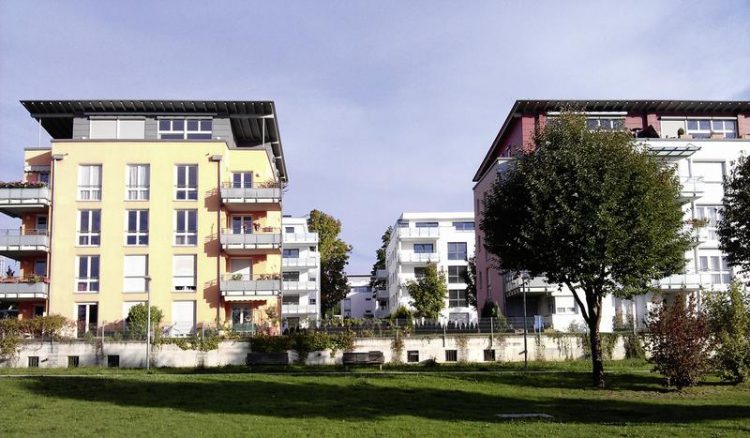Innovative local heating solution in Ludwigsburg

The new-build schemes in the Sonnenberg urban district consist of a variety of different building types. © Stadt Ludwigsburg, Referat Nachhaltige Stadtentwicklung
Consolidating heating networks in existing urban districts while also connecting areas with a low heat density is particularly ambitious from an economic point of view. The town of Ludwigsburg is taking exactly this route.
Here, an existing heating network is being expanded and in future will supply both the district of Sonnenberg and the Grünbühl housing estate, which is badly in need of refurbishment.
The BINE-Projektinfo brochure entitled “Local heating network combines new-build schemes with existing district” (04/2015) presents the district energy concept with its two components – energy-optimised construction and efficient heating provision.
Based on the example of Ludwigsburg, methods and tools have been developed and tested that can be transferred to other cities with a comparable structure.
Because the existing building fabric in Grünbühl is partially in a poor condition, it makes economic sense to demolish part of the houses and successively construct new buildings. Both urban districts in future will have a juxtaposition of refurbished existing buildings and energy-efficient new buildings with different construction standards.
The low building density in conjunction with the low heating requirement has made it more difficult to plan the heating network in parts of Sonnenberg. The most favourable option proved to be to keep the supply temperature in the network low and to only increase it on-site to the level required for space and domestic hot water heating. Since only a small temperature change has to be made, the electricity consumption remains low.
The base load for the heat supply is secured by a brine/water heat pump, with a borehole heat exchanger array totalling nearly 6 km in length, and a CHP plant.
A gas boiler covers the peak load. This research project is a collaboration between Stuttgart University of Applied Sciences, the town of Ludwigsburg and the Stadtwerke Ludwigsburg-Kornwestheim municipal utility company. The project forms a component of the town’s integrated urban development concept.
The BINE-Projektinfo brochure The BINE-Projektinfo brochure “Local heating network combines new-build schemes with existing district” (04/2015) follow this link:
http://www.bine.info/en/press/press-releases/press/pressemitteilung/innovative-n…
Uwe Milles
presse(at)bine.info
About BINE Information Service
Energy research for practical applications
The BINE Information Service reports on energy research topics, such as new materials, systems and components, as well as innovative concepts and methods. The knowledge gained is incorporated into the implementation of new technologies in practice, because first-rate information provides a basis for pioneering decisions, whether in the planning of energy-optimised buildings, increasing the efficiency of industrial processes, or integrating renewable energy sources into existing systems.
About FIZ Karlsruhe
FIZ Karlsruhe – Leibniz Institute for Information Infrastructure is a not-for-profit organization with the public mission to make sci-tech information from all over the world publicly available and to provide related services in order to support the national and international transfer of knowledge and the promotion of innovation.
Our business areas:
• STN International – the world’s leading online service for research and patent information in science and technology
• KnowEsis – innovative eScience solutions to support the process of research in all its stages, and throughout all scientific disciplines
• Databases and Information Services – Databases and science portals in mathematics, computer science, crystallography, chemistry, and energy technology
FIZ Karlsruhe is a member of the Leibniz Association (WGL) which consists of 87 German research and infrastructure institutions.
http://www.bine.info/en – BINE-Informationsdienst
Media Contact
All latest news from the category: Architecture and Construction
Newest articles

Innovative 3D printed scaffolds offer new hope for bone healing
Researchers at the Institute for Bioengineering of Catalonia have developed novel 3D printed PLA-CaP scaffolds that promote blood vessel formation, ensuring better healing and regeneration of bone tissue. Bone is…

The surprising role of gut infection in Alzheimer’s disease
ASU- and Banner Alzheimer’s Institute-led study implicates link between a common virus and the disease, which travels from the gut to the brain and may be a target for antiviral…

Molecular gardening: New enzymes discovered for protein modification pruning
How deubiquitinases USP53 and USP54 cleave long polyubiquitin chains and how the former is linked to liver disease in children. Deubiquitinases (DUBs) are enzymes used by cells to trim protein…



